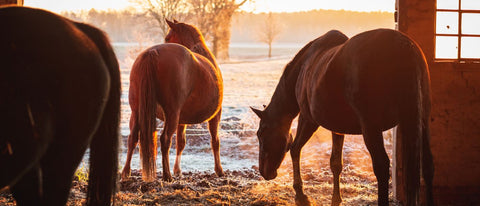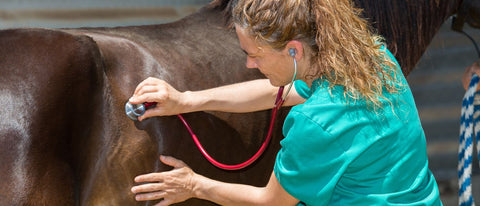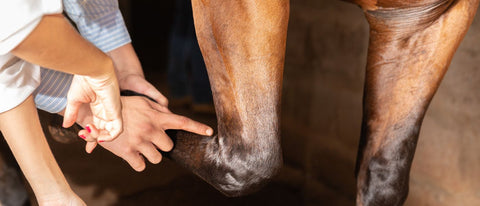
Florian ist aufgewachsen auf einem Bauernhof. Umgeben von Pferden, entdeckte er früh seine Faszination für diese majestätischen Tiere. Inspiriert von seiner reitbegeisterten Mutter, entwickelte er das Nahrungsergänzungmittel - Pferdegold. Seine tiefe Verbundenheit zur Natur und die leidenschaftliche Hingabe zu Pferden trieben ihn an, sein Unternehmen zu gründen.
If your horse is suffering from diarrhea, it will defecate more frequently. The stools in a horse with diarrhea will differ in quantity and consistency from normal stools.
Your horse is unable to optimally absorb the important nutrients from its food and is less productive. This article informs you about the causes and treatment of diarrhea.

What does diarrhea mean in horses?
If your horse has diarrhea, it will produce increased amounts of feces that differ from normal feces in quantity and consistency.
The stool is usually mushy to watery and sometimes smells unpleasant.
Diarrhea in horses can vary in severity and may indicate a serious equine disease. It has various causes .
Diarrhea is often mild, but it can also be accompanied by significant fluid and electrolyte loss and endanger your pet's life.
All causes at a glance
The causes of diarrhea in horses are varied and not always easy to determine.
These are the causes at a glance:
- Infestation with worms and other parasites
- Bacterial infections
- Wrong food
- Disease of the organs
- Psychological causes
- Bad teeth
- Foreign bodies in the digestive system such as stones or earth
- Absorption of toxins
We will discuss the most important causes in more detail in the following sections.

Perfect for your horse: Pferdegold® supplementary feed!
These specially developed supplements support your horse's diet and provide it with natural nutrients. Made in Germany, grain-free and drug-free, they come with a 30-day money-back guarantee.
Try it now!Worms & other parasites
If your horse is heavily infested with worms such as tapeworms or roundworms , or other parasites such as protozoa , cryptosporidium , or Giardia , this can lead to acute or chronic diarrhea . The intestinal wall is damaged by the parasites, and the intestinal flora becomes unbalanced.
Deworming your horse can help, but it shouldn't be unnecessary. Therefore, check when your horse last had a deworming treatment.
You can also deworm your dog later. Before you do it, it's a good idea to take a stool sample and have it analyzed for parasites.
Bacterial infections
Diarrhea can be caused by various bacteria such as salmonella , E. coli , clostridia or ehrlichia , but also by viruses such as rotavirus.
Check your horse's fever and consult your veterinarian if your animal has a fever. Only a veterinarian can determine the exact cause of diarrhea and fever.
If the diarrhea is severe and lasts longer than three days, your horse will lose too much fluid and electrolytes, which can be life-threatening.
Wrong food
If diarrhea is caused by incorrect food, there can be several reasons:
-
Poor quality of the feed , for example moldy or unclean feed
- Fast grazing
- Intolerances, for example to certain ingredients
-
Too much concentrated feed per meal
- Disproportionate amounts of fat, sugar or starch , so that the balance in the large intestine is disturbed and its mucous membrane is damaged
- Unprocessed grain
- Too little roughage
- Composition of grasses on the pasture, which are sometimes more suited to cattle and their milk production and therefore too rich for horses
To avoid diarrhea caused by changing the feed too quickly , you should only change the feed if absolutely necessary.
The transition should take place over a period of four to six weeks. A rapid transition to grazing can lead to bloating and diarrhea in the horse .
Before going out to pasture, you should give your horse enough roughage so that it is not hungry.
Two to three weeks is appropriate for grazing. To prevent grass-related diarrhea, grass seed mixtures specifically developed for horse pastures are recommended.

Disease of the organs
Diarrhea can be caused by intestinal inflammation in horses, liver disease or diseases of the oral cavity.
Consult your veterinarian, who can determine the cause of the illness based on a stool sample and a thorough examination of your pet.
Bad teeth can also cause diarrhea. Your horse can't chew its food properly, meaning the food particles aren't properly absorbed in the digestive tract .
Over time, the colon's environment can be permanently damaged. Regular dental checkups and, if necessary, dental treatment can counteract this problem.
Psychological causes
As flight animals, horses are sensitive to changes. Performance pressure, stress, loneliness , or an unfamiliar environment can affect digestion and lead to diarrhea.
Prevent diarrhea caused by stress by avoiding major, sudden changes. Sometimes, you can cure acute diarrhea simply by eliminating the changes and stress.
What accompanying symptoms can occur?
To prevent your horse's diarrhea from becoming a serious emergency, you should pay attention to the accompanying symptoms. Diarrhea can also be a sign of a serious illness .
Various accompanying symptoms suggest this:
-
Fever: An elevated body temperature indicates an infection or inflammation. Therefore, if your horse has diarrhea, measure its body temperature regularly.
-
Loss of appetite: If the horse refuses to eat, this is an indication of a health problem.
-
Altered drinking behavior: If your horse doesn't drink enough, the digestive situation can worsen. Increased thirst can also be a sign of an underlying disease.
-
Dehydration: If a horse suffers from persistent diarrhea, it loses a lot of fluid and electrolytes. Dehydration can be recognized by weakness, apathy, dry mucous membranes, sunken eyes, and a decrease in skin turgor, which means the skin only slowly returns to its original position after being lifted.
-
Apathy and depression: If your horse shows no interest in its surroundings or is less active than usual, this indicates discomfort and pain.
-
Blood in the stool: If your horse not only has diarrhea but also bloody stools, this is a serious indication of another illness. You should consult your veterinarian immediately.
- Colic symptoms: If a horse rolls around, makes belly thumping movements, repeatedly lies down and gets up, and sweats profusely, this could indicate colic. A serious problem with the digestive tract exists.
If you notice one or more of these symptoms in your horse, you should inform your veterinarian. The earlier they can diagnose an illness, the better the chances of successfully treating it.
Diarrhea or watery stool? Here's the difference!
Diarrhea is often associated with watery stools in horses. The symptoms are similar.
However, you should know the differences:
Your horse's feed contains fluid in the form of water, saliva, and digestive juices. This fluid is important for a functioning metabolism and is absorbed through the intestinal wall of the large intestine. It transports the substances dissolved in the feed.
If there is more fluid in the large intestine than the body needs, it cannot be fully absorbed through the intestinal wall . Watery stools can be caused by an imbalance of bacteria in the large intestine , fermentation due to improper feed , ingestion of large amounts of water, or mycotoxins.
The mostly brownish stool is excreted independently of the feces during bowel movements. Your horse's hind legs will show severe soiling due to the stool.
In diarrhea, there isn't too much fluid in the intestines. Fluid absorption through the mucous membranes of the large intestine is impaired. Since hardly any water is removed from the food, the stool is mushy.
If your horse has diarrhea, it frequently defecates, usually has little appetite, and appears listless. The intestinal flora is out of balance.
Diarrhea can quickly weaken the immune system.
Diarrhea in horses: What can you do?
If you want to stop your horse's diarrhea, you should pay attention to its severity. Severe diarrhea must be treated by a veterinarian .
Treating horse diarrhea isn't just about alleviating the symptoms. The cause must be addressed.
Does your horse have diarrhea, but it's not as severe as it seems? In any case, you should switch to a light diet. Give your horse plenty of hay and always provide plenty of water.
The intestinal mucosa can be supported by administering flaxseed. However, you should avoid home remedies like yogurt, as they could actually worsen diarrhea.
Optimal feeding: The best expert tips
If your horse suffers from diarrhea, you can support it with optimal feeding.
It can also prevent diarrhea :
- Hay and straw are suitable because they are dry and structurally rich and provide a balance to the watery, energy-rich grass, especially at the beginning of the grazing season.
You should give approximately one kilogram of roughage per 100 kilograms of body weight before grazing.
- Other roughage products are composed of crude fiber and roughage, similar to hay, and contain volatile fatty acids as a long-lasting energy source.
Roughage stimulates saliva production and extends feeding times. Desugared beet pulp, which is molasses-free, is also suitable.
- Supplemental feed can support the treatment of diarrhea. Probiotic feeds , such as those containing yeast, can also be used as supplemental feed.
- If your horse has diarrhea, it needs plenty of water and electrolytes.
- Small amounts of cold-pressed vegetable oils with a high content of omega-3 fatty acids (however, your horse should not receive more than 150 milliliters of this per day).

Which herbs can help with diarrhea?
Various herbs can help with diarrhea. Add 50 grams of this mixture to your horse's regular feed three times a day .
These herbs are suitable:
- yarrow
- sage
- Lemon balm
- peppermint
- oregano
- anise
- chamomile
When should you see a veterinarian?
You should consult a veterinarian if your horse has severe diarrhea , colic symptoms, or blood in its stool. You should also consult your veterinarian immediately if it has a high fever.
If the diarrhea lasts longer than three days, this is also a case for the vet.
Conclusion
Diarrhea in horses can be harmless and clear up quickly. However, it can also be a sign of a serious illness.
If the diarrhea lasts longer than three days or is accompanied by various symptoms such as colic, fever or blood in the stool, you should definitely consult a veterinarian.
Diarrhea can have various causes. Make sure your horse always gets enough roughage. Due to the high fluid loss, you must always provide your horse with plenty of water.
FAQ
What can prevent diarrhea in my horse?
You can prevent diarrhea in your horse with high-quality roughage, slow grazing, clean drinking water and regular deworming.
Especially with older animals, you should have their teeth checked regularly. Feeding should be tailored to your pet's needs. Ensure a balanced ratio of concentrate to roughage.
How does intestinal inflammation manifest itself in horses?
Intestinal inflammation in horses is characterized by watery, sour and foul-smelling feces as well as lethargy and loss of appetite.
How long does diarrhea last in horses?
Diarrhea in horses should not last longer than three days. If it persists for more than three days, you should consult your veterinarian.
Important:
Pferdegold is not a substitute for veterinary diagnosis or treatment. The information contained in this article is for general informational purposes only and is intended to help improve your horse's well-being.Pferdegold products do not treat or cure diseases , but rather support your horse in compensating for nutritional deficiencies through targeted nutrient intake .
However, they are not a substitute for professional advice from a veterinarian or specialist. If your horse has any health problems, we strongly recommend consulting a veterinarian. Pferdegold assumes no liability for decisions made based on the information provided here.

















